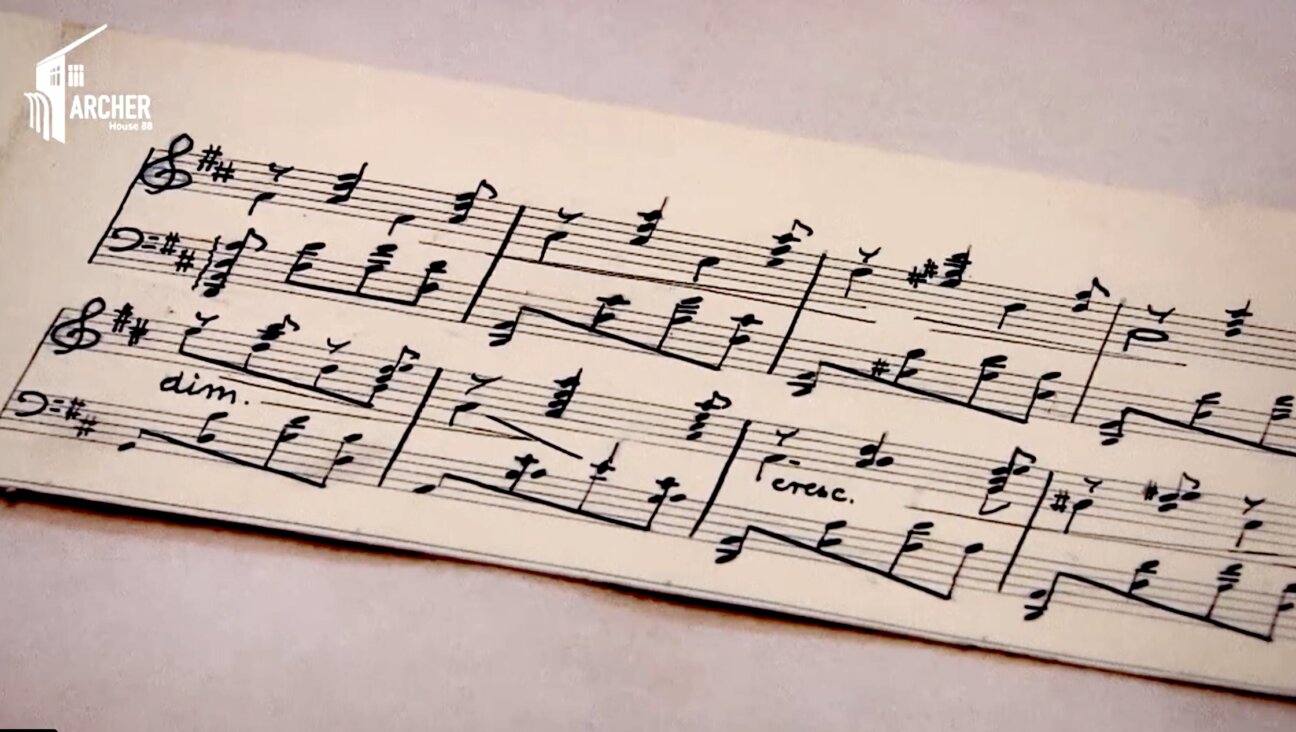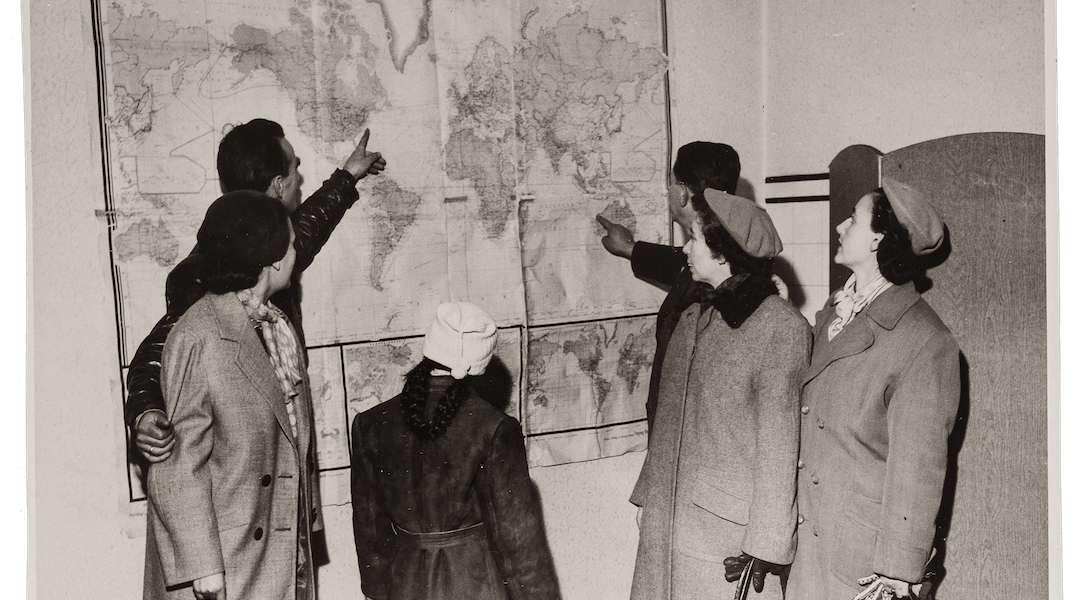New Mayor Puts a Different Face On Father Flanagan’s Boys Town
BOYS TOWN, Neb. — In a large Tudor-style house on a quiet, well-kept cul-de-sac, Daniel Ocanto, 17, proudly shows a visitor his bedroom. Shy yet articulate, he talks about his love of classic rock — hence the Pink Floyd posters and drum set — and his plans to attend Brandeis University next year.
It seems like a typical suburban scene, and Ocanto, wearing Birkenstocks and baggy jeans, newly employed at the local ice cream parlor, seems the typical suburban Jewish teenager.
But appearances can be deceiving. The bucolic setting notwithstanding, Ocanto lives in a complex for “troubled” youth. This is Boys Town — yes, Father Flanagan’s Boys’ Home, the home for street kids made famous by Spencer Tracy and Mickey Rooney. A Hollywood icon, it conjures images of homeless boys farming on the prairie, orphans saying grace and reformed riff-raff attending Sunday Mass.
All true, except that Daniel Ocanto goes to synagogue instead of church. What’s more, he’s the mayor of Boys Town.
In the much-loved 1938 film “Boys Town,” which made the facility a household name, Mickey Rooney plays Whitey Marsh, a tough-as-nails vagrant. Under the guidance of Father Edward Flanagan, portrayed by Tracy (who won his second Oscar for the role), Whitey transforms himself into an admirable, good-as-gold Boys Town mayor.
Over the years, Boys Town has matured into a full-fledged city for children, complete with churches, schools and its own post office and ZIP code. But it is still a treatment facility. And while religion and prayer remain strong components of the regimen, at Boys Town, as Flanagan once said, “Every boy must learn to pray — how he prays is up to him.”
Ocanto said he was the first Jewish kid many of his Boys Town peers had ever met. “It’s given me an opportunity to reflect on what my religion means to me,” he said. “I’ve been given more time to think about it, to build my own independent faith.” Another Jewish citizen had recently arrived, Ocanto noted, doubling Boys Town’s current Jewish population to two.
Make no mistake: The movie, with its earnestness and its “he ain’t heavy, Father, he’s m’brother” tone, may be Hollywood legend, but Boys Town is as real as the dysfunctional homes, harsh streets and troubled histories from which today’s residents arrive.
Last month, the real-life citizens of Boys Town elected their 100th mayor — Ocanto, who is the first Jew to hold the position, according to the public record. “I owe a lot to Boys Town, and I want to give something back,” said Ocanto, who has resided at Boys Town for nearly two years.
Like Rooney’s Whitey Marsh, when Ocanto arrived at Boys Town — he is not permitted to discuss the reason — he had little intention of staying. “When I got here, I thought I was better than everyone else,” he said. “I thought I’d be out of here in nine months.”
Yet nine months after his arrival, Ocanto and his caretakers decided he would stay at Boys Town until his high school graduation. It was only then that he considered throwing his hat into the ring. “I knew I had ambitions,” he said. “If I run for mayor, I’d get the most out of Boys Town.”
“Plus, being mayor,” he added, “I’m given opportunities, scholarships, I wouldn’t otherwise have.”
Born in Florida, Ocanto was raised in a Conservative Jewish home in Omaha. Today, however, Ocanto, like all citizens of Boys Town, lives with eight “brothers” in a large house supervised by his “family-teachers,” Robert and Jeannie Wright, who are part of the facility’s live-in staff. The house, with its long dining-room table and two well-stocked refrigerators, is decorated with the trappings of a happy — and diverse — family: framed photographs depicting birthdays, vacations and Easter-egg hunts sit near the entrance; shelves overflow with well-worn books and games, and certificates for good grades adorn the walls.
The boys in the house, ages 12 to 17, greeted a recent Forward visitor with an introduction, a firm handshake and a “nice to meet you.” Beverages were offered immediately. The boys were so polite, so charming, it was difficult to imagine them as victims of broken homes and violent streets. At the Wright house, the talk over a pizza dinner was of sports, good grades and, most of all, the future — something these most of these kids never imagined they had prior to their arrival at Boys Town.
The original Father Flanagan’s Boys’ Home was a single residential house for orphans. Over the past 85 and a half years it has evolved into Girls and Boys Town, a national organization that cares for nearly 40,000 neglected children. The nonprofit organization is headquartered in the Village of Boys Town — now comfortably nestled within Omaha’s sprawl — which houses some 500 “citizens.”
There are no gates and no fences at Boys Town. The grounds are well-maintained, unlocked bicycles dot the landscape and groups of children — labeled as “troublemakers” back home — smile and wave at visitors.
The majority of Boys Town’s residents — mostly abandoned, abused and neglected children — arrive at the facility from social service agencies, private referrals and juvenile court systems. Through a complex system of goal-oriented treatment and peer leadership, these children are, during an average stay of 20 months, hopefully reshaped into valuable, confident members of society.
Boys Town operates on a complicated system of rules and self-governance. New arrivals accrue “points” on a daily basis; more seasoned residents earn greater freedom with good behavior. While some may find it restrictive, the alternatives — such as homelessness, abusive families or juvenile detention — are far worse; most kids are thankful to be Boys Town citizens.
Every town needs a government, and Boys Town, therefore, needs a boys’ — and since 1979, girls’ — government. For 67 years the residents have elected a mayor, as well as council members and commissioners, who constitute a student council and ensure that kids’ opinions are articulated.
As mayor, one of Ocanto’s many goals is to expand Boys Town’s recycling program. “We’re a town,” he said. “We really could be making a huge difference.” He’s also hoping to abolish the socks-under-sandals rule and “whatever my peers bring to me as a concern.”
Having the town mayor as its resident — as well as star athletes and the combined highest grade point average in school — lends a certain cache to the Wright home. “We’re like a big family, only bigger, more diverse,” said Robert Wright, who has worked at the organization for nearly a decade.
“A lot bigger! I never thought I’d have nine kids,” Jeannie Wright added. In addition to caring for eight boys, the couple has an infant daughter, Morgan. During the Forward’s visit, the boys took turns holding and coddling her.
“Daniel’s not that popular in school — no offense — but his speech was awesome,” said Eddie, a 16-year-old Chicagoan who, earlier in a conversation, said that he loved school. “Daniel’s up for the job. He’s a great orator for the community. When he gave his speech I was like, wow.”
“Some people said they voted for him because of the way he treats people,” Jeannie said.
“Honestly, this was one of the toughest competitions I’ve ever been in,” Ocanto said. “Not only was I running against friends, but people who were just as qualified as I was.”
Ocanto is hardly the first Jew to be actively involved with the organization. Flanagan founded his home for boys in 1917 with $90 borrowed from Henry Monsky, a prominent Jewish lawyer who insisted on anonymity at a time when Catholic-Jewish cooperation was rare. In addition to serving on the Boys Town executive board and as Flanagan’s personal attorney, Monsky served as president of B’nai B’rith International from 1938 until his death in 1947.
“They were men of different faiths,” said Oliver Pollak, a lawyer and history professor at the University of Nebraska at Omaha. “Both had faith, particularly faith in the next generation.”
Faith remains integral to Boys Town today. “If you’re a Lutheran, I’m gonna make you a better Lutheran than you are now,” Father Val Peter, director of Boys Town since 1984, told the Forward. “If you’re a Jew, I’m gonna make you a better Jew than you are now.”
On Friday evenings, Ocanto attends Beth El Synagogue, Omaha’s Conservative congregation, which happens to be across the street from Boys Town; on Sundays, he spends the morning reading and watching television at Father Peter’s house.
Of course, as mayor, in addition to meeting the press and working the megaphone at Boys Town’s annual Memorial Day run, there are less appealing duties to attend to. Two days after the pizza dinner at the Wright home, Ocanto sat at a cafeteria with Father Peter; Robert Hayes, Boys Town’s director of maintenance, and Dan Daley, the home campus director. The talk was of improvement projects for the coming year: new water chillers, additional windows for the Olympic-sized pool and, bizarrely, new wildlife to add to the pond.
Throughout the meeting, Father Peter, a smiling, quirky man, continuously jumped up, greeting everyone from former residents to German tourists. Under his leadership, Boys and Girls Town has expanded beyond the village to 19 sites in 14 states. “We used to be ‘Little House on the Prairie,’” he said. “Now we’re a big ol’ place.”
The group piled into a car for a brief tour of recent improvement projects, stopping at the newly renovated weight room, passing the on-site auto shop, lumbering along tree-lined gravel roads, past teenage boys using weed-whackers — “Hi, Father!” many of them shouted out with a wave — and apple orchards.
Ocanto was relatively silent. Did the mayor expect to be worrying about potholes, and would, say, newly installed air-conditioners mark a successful term as mayor? He smiled and shrugged. “I want to set a higher standard for next year’s mayor,” he said.
Ocanto said he hopes to leave a legacy of strong leadership. “When they think of me, I hope they’ll think of a good role model,” he said.
















